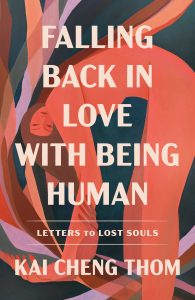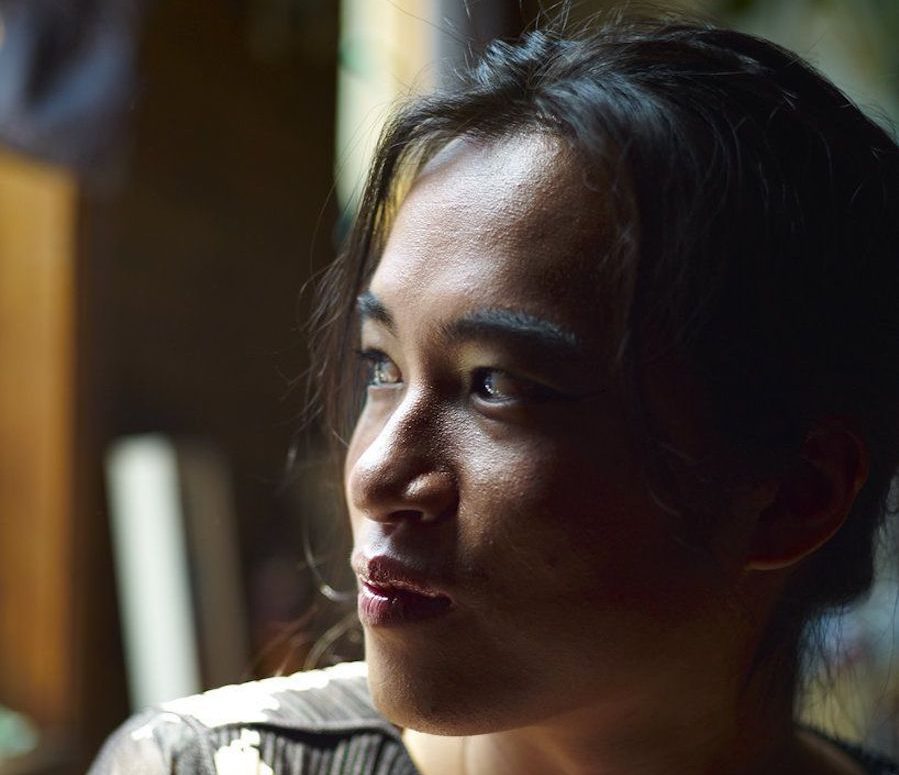Broadview’s September 2023 issue featured a book review of Falling Back in Love with Being Human. Read the review here.
“This book is my act of prayer in a collapsing world,” Kai Cheng Thom writes in her new title, Falling Back in Love with Being Human.
Thom is a Toronto-based activist, conflict mediator and spiritual healer, a former psychotherapist and sex worker, and a Chinese transgender woman. Her latest book — out on Aug. 1 — explores radical empathy for both her opponents and herself through a series of letters addressed to past and future versions of herself, to people who’ve hurt her, and even to transphobes themselves. Through the process of writing these letters, Thom tells Broadview, she rediscovered a faith “that people are good and things will work out.”
Kylie Adair sat down with Thom to learn more.
Kylie Adair: The last year or so has seen a uniquely intense wave of anti-queer and anti-trans hate. Has this tested your rediscovered faith in people’s goodness? Has the book guided you through this time?
Kai Cheng Thom: I’m really grateful that I did write the book right when I wrote it [in the spring and summer of 2021], because it did prepare me for this: the depths to which people will go in order to try and release themselves from their fear by placing it onto other people. The thing I really don’t want to do is to demonize the people who are acting or speaking in hateful and fearful ways — first of all, because that doesn’t solve the problem, and second, because what I really refuse to do is to allow hatred to rob me of my compassion. I will not allow transphobia and homophobia to make me into a person defined by fear and anger. They just cannot do that to me.
KA: Do you hope the book acts as a guide to help others through this time, too?
KCT: My hope is that the book shines a light on the fact that our righteous rage, anger, disappointment in others is actually very profoundly connected to the rage we feel towards ourselves. Yes, it’s abundantly clear that the excesses of capitalism and the ruling class are destroying the world, and so we’re angry at them. But I actually suspect there’s a mirror to that rage that exists in all of us who are politically aware — we’re angry at ourselves for not being able to stop it. And the book, I think, says it’s possible to love the parts of ourselves we’re angry with, to fall in love with our own humanity, the part of us that is overwhelmed and doesn’t know all the right answers. I think when we make that shift to loving our own humanity, it helps us to understand and more deeply connect with other people whose humanity also causes them to act in flawed or even terrible ways.
KA: After each letter, you include an instruction for the reader, almost a small spiritual ritual and maybe a glimpse into your work as a spiritual healer. Can you tell me about that work?
KCT: I’m still in a very beginning stage of getting deeply in touch with that, but part of healing the collective trauma that we all live in now from colonization, capitalism, and the various oppressions of the world requires that we tap into faith and spirituality. And I don’t mean religion; I actually just mean getting a sense of the wonder and mystery of ourselves as individuals and as a collective. Finding ways to be together that transcend the literal and the physical. Tapping into futurity, ancestry and lineage — that has a lot of potential for queer people of colour, but also for people in general, to move into a different way of being.
More on Broadview:
- “It was the scariest thing I’d ever done … and also the best”: celebrating later-in-life transition stories
- One of the ‘Progressive Copts’ on the future he sees for the Coptic diaspora
- What faith and gender expression mean to this transfeminine United Church worship leader
KA: What you’re saying reminds me of a theme in the book of trans femmes throughout time being chosen — by Goddess, you write — to do this kind of healing work. Can you tell me more about that and your connection to that lineage?
KCT: I have this theory from my own lived experience that queerness and transness are a really deeply spiritual experience. The majority of us grow up in a dominant culture that explicitly says, Don’t be queer, don’t be trans. And yet, somehow, there is an embodied knowing inside of us that draws us towards change and transformation, even when there is a terrible price to pay for that.
I think it’s impossible to say people wouldn’t acquire some kind of spiritual wisdom or deeper knowledge of the world and ourselves from that. Trans femininity in particular speaks to this experience, because of the intensity of that initiation, the levels of violence and repulsion that trans women and trans femmes are subjected to, but we’re coming out anyway — or preparing to do it anyway. We could frame that as a pathology or a sickness. We could say it’s a tragedy. Or we could frame it as a calling, something that comes from deep within, maybe something that also comes from spirit, from outside, Goddess, whatever you want to call it. And then the question is what are we going to do with that?

There’s some pushback, and rightfully so, about this idea of the trans person as chosen. That’s still a stereotype and idealization, and trans people should get to rest — we shouldn’t have to save the world; maybe we could just eat pizza or whatever. And I think that’s very fair. Not everyone wants to go on a hero’s journey, or should have to. The fact of the matter remains, however, that in the world we live in, we are chosen for that. We are chosen for the violence. We are chosen for discrimination. We have this innate seeking of change, to be who we are, and that does come with insight. It does come with wisdom. And I do think that from a collectivist perspective, we have a responsibility to do something with that wisdom.
This interview has been edited for length and clarity.
***
Kylie Adair is a freelance journalist based in Montreal.















